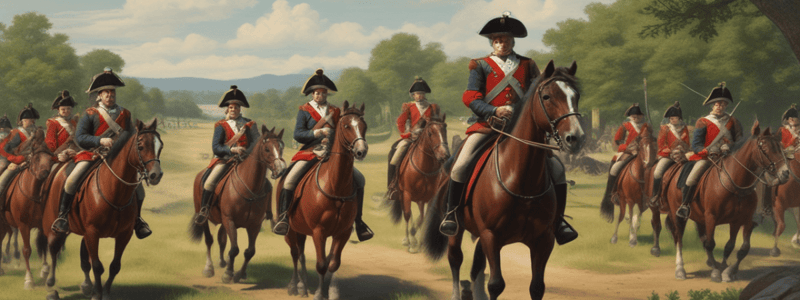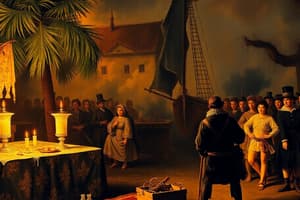Podcast
Questions and Answers
Why did Britain pass laws to tax the colonists?
Why did Britain pass laws to tax the colonists?
- To force the colonists to buy more British goods.
- To give the colonists more power in the British government.
- To pay for the war debt from the French and Indian War. (correct)
- To punish the colonists for supporting the French during the French and Indian War.
What did the Patriots demand in response to the taxation laws?
What did the Patriots demand in response to the taxation laws?
- The right to elect their own king.
- Lower taxes on all goods.
- Full independence from Britain.
- Representation in Parliament to have a say in taxation. (correct)
What was the main purpose of the Declaratory Act?
What was the main purpose of the Declaratory Act?
- To give colonists representation in Parliament
- To impose stricter taxes on the colonists
- To assert Parliament's full lawmaking power over the colonists (correct)
- To prohibit tea imports from Britain
What was the result of the colonists' boycott of taxed items?
What was the result of the colonists' boycott of taxed items?
What was the outcome of the boycotts and protests against the Townshend Acts?
What was the outcome of the boycotts and protests against the Townshend Acts?
What was Benjamin Franklin's message to Parliament?
What was Benjamin Franklin's message to Parliament?
What was the main reason for the colonists' continued protests after the repeal of the Townshend Acts?
What was the main reason for the colonists' continued protests after the repeal of the Townshend Acts?
What was the purpose of the Stamp Act?
What was the purpose of the Stamp Act?
What was the name given to the protest in May 1773, where tea was dumped into Boston Harbor?
What was the name given to the protest in May 1773, where tea was dumped into Boston Harbor?
What was the role of the Sons of Liberty in the Boston Tea Party?
What was the role of the Sons of Liberty in the Boston Tea Party?
Flashcards are hidden until you start studying
Study Notes
Roots of Colonial Taxation
- After the French and Indian War (1754-1763), Britain saw an opportunity to use the colonies to help pay their war debt by taxing everyday items.
- This meant charging an extra fee for these items, which led to the cry "No taxation without representation!" from colonists who felt they should have a say in what gets taxed and how the tax money is used.
The Stamp Act
- The Stamp Act was passed by Parliament on March 22, 1765, requiring colonists to purchase stamps from the town tax collector and place them on paper products to show they had paid the tax.
- Many colonists believed this was fair, but others felt the colonies should have a representative in Parliament to make decisions on taxation.
Resistance and Boycotts
- Patriots spoke out against Parliament, threatening, tarring, and feathering tax collectors, and scaring them out of towns.
- Colonists began boycotting (refusing to buy) taxed items, which meant Britain wouldn't get the tax money.
- This led to the repeal of the Stamp Act in March 1766.
The Declaratory Act and Townshend Acts
- The Declaratory Act (1766) stated that Parliament had full lawmaking power over the colonists and could tax them however they wanted.
- The Townshend Acts (June 1767) placed a tax on tea, glass, paper, paint, and lead, leading to further boycotts and protests.
- The colonists did not agree with these acts and continued to resist taxation without representation.
The Colonies Unite
- Cities up and down the coast rejected shipments of taxed items, and the colonists united in their protests.
- The Boston Tea Party (May 1773) saw the Sons of Liberty, dressed as Mohawk Indians, board three ships in Boston Harbor and dump about 90,000 pounds of tea from Britain into the water.
Studying That Suits You
Use AI to generate personalized quizzes and flashcards to suit your learning preferences.




